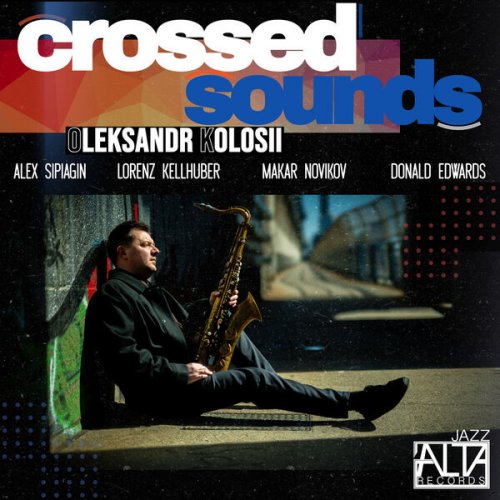Mstislav Rostropovich - Mstislav Rostropovich Plays Cello Works (2008)
- 02 Oct, 14:52
- change text size:
Facebook
Twitter
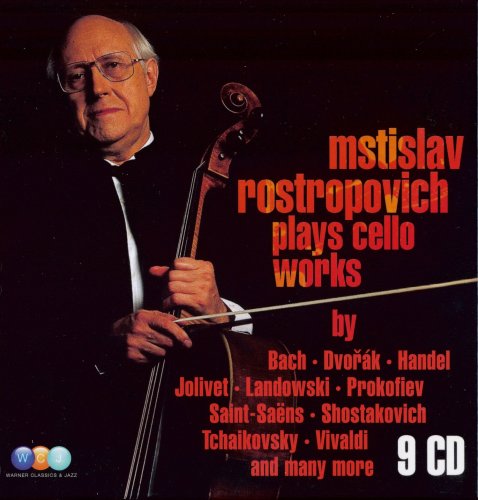
Artist: Mstislav Rostropovich, The Saint Paul Chamber Orchestra, Boston Symphony Orchestra, Orchestre National de France, London Symphony Orchestra, Collegium Musicum de Zurich, Hugh Wolff, Seiji Ozawa, Crist¢bal Halffter, André Jolivet, Paul Sacher, Kent Nagano
Title: Mstislav Rostropovich Plays Cello Works
Year Of Release: 2008
Label: Warner Classics & Jazz – 2564 69681-7
Genre: Classical
Quality: FLAC (image + .cue, log, artwork)
Total Time: 9:45:46
Total Size: 2.24 GB
WebSite: Album Preview
Title: Mstislav Rostropovich Plays Cello Works
Year Of Release: 2008
Label: Warner Classics & Jazz – 2564 69681-7
Genre: Classical
Quality: FLAC (image + .cue, log, artwork)
Total Time: 9:45:46
Total Size: 2.24 GB
WebSite: Album Preview
CD1: Music For Cello And Organ 67:16
1-1 –Girolamo Frescobaldi Toccata 4:44
1-2 –Alessandro Marcello Adagio, BWV 974 5:05
–Johann Sebastian Bach 3 Chorale Preludes
1-3 – I. Ach, Was Ist Doch Unser Leben, BWV 743 5:14
1-4 – II. Vater Unser Im Himmelreich, BWV 762 4:12
1-5 – III. Christus, Der Uns Selig Macht, BWV 747 5:12
-
1-6 –Georg Friedrich Händel Aria 3:41
1-7 –Johann Sebastian Bach Toccata, Adagio & Fugue In C Major, BWV 564: Adagio 4:00
–Louis De Caix D'Hervelois Portraits De Jeunes Filles De La France D'Autrefois / Portraits Of Young Ladies From Old France
1-8 – I. La Florentine 4:40
1-9 – II. La Provençale 2:04
1-10 – III. La Lionnoise 2:24
1-11 – IV. La Bavaroise 1:35
1-12 – V. La Russienne 1:37
1-13 – VI. La Siciliene 1:55
1-14 – VII. La Milaneze 2:05
–Joseph Rheinberger* 3 Pieces (arr. From 6 Stucke Für Violine Und Orgel, Op.150)
1-15 – I Abendlied 4:13
1-16 – II Pastorale 3:42
1-17 – III Elegie 4:07
-
1-18 –Camille Saint-Saëns Prière, Op.158 5:29
CD2: Vivaldi, Tartini, C.P.E. Bach: Cello ConcertosVivaldi, Tartini, C.P.E. Bach: Cello Concertos 52:40
–Antonio Vivaldi Concerto In D Minor, RV 406
2-1 – I. Allegro Non Molto 3:07
2-2 – II. Andante 2:52
2-3 – III. Minuetto 3:28
–Giuseppe Tartini Concerto In D Major
2-4 – I. Largo 6:28
2-5 – II. Allegro 5:15
2-6 – III. Grave 4:52
2-7 – IV. Allegro 3:00
–Carl Philipp Emanuel Bach Concerto No.2 In B Flat Major, Wq 171/H436
2-8 – I. Allegro 7:30
2-9 – II. Adagio 9:11
2-10 – III. Allegro Assai 6:17
CD3: Dvořák: Cello Concerto / Tchaikovsky: Rococo Variations 56:35
–Antonín Dvořák Cello Concerto In B Minor, Op. 104
3-1 – I. Allegro 14:37
3-2 – II. Adagio Ma Non Troppo 11:48
3-3 – III. Finale: Allegro Moderato 12:16
-
3-4 –Piotr Illitch Tchaïkovsky* Variations On A Rococo Theme, Op.33 17:33
CD4: Prokofiev: Symphony-Concerto / Halffter: Cello Concerto No.2 75:15
–Sergey Prokofiev* Symphony-Concerto In E Minor, Op.125
4-1 – I. Andante 10:17
4-2 – II. Allegro Giusto 16:58
4-3 – III. Andante Con Moto 9:41
–Cristóbal Halffter Cello Concerto No.2, "No Queda Mas Que El Silencio" ("Nothing Is Left But Silence"): In Memory Of Federico Garcia Lorca, On The Fiftieth Anniversary Of His Death
4-4 – I. El Grito Deja En El Viento Une Sombra De Cipres / The Cry Leaves A Cypress Shadow In The Wind 11:07
4-5 – II. Vine A Este Mundo Con Ojos Y Me Voy Sin Ellos / I Came Into This World With Eyes And Quit It Without Them 16:36
4-6 – III. Si Muero, Dejad El Balcón Abierto / If I Die, Leave The Balcony Open 10:24
CD5: Jolivet, Shostakovich, Moret: Cello Concertos 74:09
–André Jolivet Cello Concerto No.2
5-1 – I. Allant - Vivement - Cadence 15:40
5-2 – II. Aria 3:54
5-3 – III Animé 2:03
–Dmitri Shostakovich Cello Concerto No.1 In E Flat Major, Op.107
5-4 – I Allegretto 6:21
5-5 – II Moderato 9:55
5-6 – III Cadenza 5:04
5-7 – IV Allegro Con Moto 4:40
–Norbert Moret Cello Concerto
5-8 – I. Chanson Pour Passer Le Temps / Song To Pass The Time 9:02
5-9 – II. Chanson D'Amour / Love Song 8:38
5-10 – III. Chanson Du Vent D'Ouest / Song Of The West Wind 8:31
CD6: Milhaud: Cello Concerto No.1 / Hoddinott: Noctis Equi / Penderecki: Cello Concerto No.2 69:22
–Darius Milhaud Cello Concerto No.1, Op.136
6-1 – I. Nonchalant 5:13
6-2 – II. Grave 6:15
6-3 – III. Joyeux 3:05
–Alun Hoddinott Noctis Equi, Op.132
6-4 – I. Andante - Presto - Andante 9:57
6-5 – II. Presto - Cadenza - Andante - Adagio 11:02
-
6-6 –Krzysztof Penderecki Cello Concerto No.2 33:34
CD7: Honegger: Cello Concerto / Gagneux: Triptyque / Shchedrin: Sotto Voce Concerto
–Arthur Honegger Cello Concerto
7-1 – I. Andante 5:53
7-2 – II. Lento 4:09
7-3 – III. Allegro Marcato 5:22
–Renaud Gagneux Triptyque
7-4 – I. Prenlier Mouvement 4:51
7-5 – II. Deuxieme Mouvement 8:54
7-6 – III. Troisieme Mouveillent 3:46
–Rodion Shchedrin* Sotto Voce Concerto
7-7 – I . Sostenuto 7:06
7-8 – II. Allegretto Moderato 14:33
7-9 – III. Scherzo: Cadenza 3:53
7-10 – IV. Finale: Sostenuto - Allegro - Sostenuto 12:23
CD8: Landowski: Un Enfant Appelle / La Prison
–Marcel Landowski Un Enfant Appelle (After Poems By Marie Noel)
8-1 – I. Un Enfant Appelle, Loin, Très Loin / A Child Is Calling From Afar 8:36
8-2 – II. Je Crois Très Bas / I Believe Deeply 6:11
8-3 – III. La Nuit Même Où Il Fut Livré / The Very Night He Was Delivered 8:47
–Marcel Landowski La Prison
8-4 – I. L'Attente / Waiting 9:02
8-5 – II. L'Interrogatoire / The Interrogation 12:35
8-6 – III. La Prison / The Prison 14:19
CD9: Knaifel: Chapter Eight 59:58
–Alexander Knaifel Chapter Eight: Canticum Canticorum (Song Of Songs) For Church, Choruses And Cello (In XXXII Stanzas; Sung In Russian)
9-1 – Who Is This Coming Up From The Wilderness... (Stanzas I-VI: Verses 5, 1, 13,2,2,9) 1:37
9-2 – O That You Were Like A Brother To Me... (Stanzas VII-XI: Verses 1, 6, 6, 2, 1) 11:22
9-3 – Make Haste, My Beloved... (Stanzas XII-XV: Verses 14, 6, 1, 5) 8:25
9-4 – You Who Dwell In The Gardens... (Stanzas XVI-XXII: Verses 13, 2, 2, 9, 1, 1, 10) 10:53
9-5 – Set Me As A Seal Upon Your Heart... (Stanzas XXIII-XXVIII: Verses 6, 14, 7, 5, 6, 5) 10:53
9-6 – His Left Hand Is Under My Head... (Stanzas XXIX-XXXII: Verses 3, 2, 10, 9) 6:46
1-1 –Girolamo Frescobaldi Toccata 4:44
1-2 –Alessandro Marcello Adagio, BWV 974 5:05
–Johann Sebastian Bach 3 Chorale Preludes
1-3 – I. Ach, Was Ist Doch Unser Leben, BWV 743 5:14
1-4 – II. Vater Unser Im Himmelreich, BWV 762 4:12
1-5 – III. Christus, Der Uns Selig Macht, BWV 747 5:12
-
1-6 –Georg Friedrich Händel Aria 3:41
1-7 –Johann Sebastian Bach Toccata, Adagio & Fugue In C Major, BWV 564: Adagio 4:00
–Louis De Caix D'Hervelois Portraits De Jeunes Filles De La France D'Autrefois / Portraits Of Young Ladies From Old France
1-8 – I. La Florentine 4:40
1-9 – II. La Provençale 2:04
1-10 – III. La Lionnoise 2:24
1-11 – IV. La Bavaroise 1:35
1-12 – V. La Russienne 1:37
1-13 – VI. La Siciliene 1:55
1-14 – VII. La Milaneze 2:05
–Joseph Rheinberger* 3 Pieces (arr. From 6 Stucke Für Violine Und Orgel, Op.150)
1-15 – I Abendlied 4:13
1-16 – II Pastorale 3:42
1-17 – III Elegie 4:07
-
1-18 –Camille Saint-Saëns Prière, Op.158 5:29
CD2: Vivaldi, Tartini, C.P.E. Bach: Cello ConcertosVivaldi, Tartini, C.P.E. Bach: Cello Concertos 52:40
–Antonio Vivaldi Concerto In D Minor, RV 406
2-1 – I. Allegro Non Molto 3:07
2-2 – II. Andante 2:52
2-3 – III. Minuetto 3:28
–Giuseppe Tartini Concerto In D Major
2-4 – I. Largo 6:28
2-5 – II. Allegro 5:15
2-6 – III. Grave 4:52
2-7 – IV. Allegro 3:00
–Carl Philipp Emanuel Bach Concerto No.2 In B Flat Major, Wq 171/H436
2-8 – I. Allegro 7:30
2-9 – II. Adagio 9:11
2-10 – III. Allegro Assai 6:17
CD3: Dvořák: Cello Concerto / Tchaikovsky: Rococo Variations 56:35
–Antonín Dvořák Cello Concerto In B Minor, Op. 104
3-1 – I. Allegro 14:37
3-2 – II. Adagio Ma Non Troppo 11:48
3-3 – III. Finale: Allegro Moderato 12:16
-
3-4 –Piotr Illitch Tchaïkovsky* Variations On A Rococo Theme, Op.33 17:33
CD4: Prokofiev: Symphony-Concerto / Halffter: Cello Concerto No.2 75:15
–Sergey Prokofiev* Symphony-Concerto In E Minor, Op.125
4-1 – I. Andante 10:17
4-2 – II. Allegro Giusto 16:58
4-3 – III. Andante Con Moto 9:41
–Cristóbal Halffter Cello Concerto No.2, "No Queda Mas Que El Silencio" ("Nothing Is Left But Silence"): In Memory Of Federico Garcia Lorca, On The Fiftieth Anniversary Of His Death
4-4 – I. El Grito Deja En El Viento Une Sombra De Cipres / The Cry Leaves A Cypress Shadow In The Wind 11:07
4-5 – II. Vine A Este Mundo Con Ojos Y Me Voy Sin Ellos / I Came Into This World With Eyes And Quit It Without Them 16:36
4-6 – III. Si Muero, Dejad El Balcón Abierto / If I Die, Leave The Balcony Open 10:24
CD5: Jolivet, Shostakovich, Moret: Cello Concertos 74:09
–André Jolivet Cello Concerto No.2
5-1 – I. Allant - Vivement - Cadence 15:40
5-2 – II. Aria 3:54
5-3 – III Animé 2:03
–Dmitri Shostakovich Cello Concerto No.1 In E Flat Major, Op.107
5-4 – I Allegretto 6:21
5-5 – II Moderato 9:55
5-6 – III Cadenza 5:04
5-7 – IV Allegro Con Moto 4:40
–Norbert Moret Cello Concerto
5-8 – I. Chanson Pour Passer Le Temps / Song To Pass The Time 9:02
5-9 – II. Chanson D'Amour / Love Song 8:38
5-10 – III. Chanson Du Vent D'Ouest / Song Of The West Wind 8:31
CD6: Milhaud: Cello Concerto No.1 / Hoddinott: Noctis Equi / Penderecki: Cello Concerto No.2 69:22
–Darius Milhaud Cello Concerto No.1, Op.136
6-1 – I. Nonchalant 5:13
6-2 – II. Grave 6:15
6-3 – III. Joyeux 3:05
–Alun Hoddinott Noctis Equi, Op.132
6-4 – I. Andante - Presto - Andante 9:57
6-5 – II. Presto - Cadenza - Andante - Adagio 11:02
-
6-6 –Krzysztof Penderecki Cello Concerto No.2 33:34
CD7: Honegger: Cello Concerto / Gagneux: Triptyque / Shchedrin: Sotto Voce Concerto
–Arthur Honegger Cello Concerto
7-1 – I. Andante 5:53
7-2 – II. Lento 4:09
7-3 – III. Allegro Marcato 5:22
–Renaud Gagneux Triptyque
7-4 – I. Prenlier Mouvement 4:51
7-5 – II. Deuxieme Mouvement 8:54
7-6 – III. Troisieme Mouveillent 3:46
–Rodion Shchedrin* Sotto Voce Concerto
7-7 – I . Sostenuto 7:06
7-8 – II. Allegretto Moderato 14:33
7-9 – III. Scherzo: Cadenza 3:53
7-10 – IV. Finale: Sostenuto - Allegro - Sostenuto 12:23
CD8: Landowski: Un Enfant Appelle / La Prison
–Marcel Landowski Un Enfant Appelle (After Poems By Marie Noel)
8-1 – I. Un Enfant Appelle, Loin, Très Loin / A Child Is Calling From Afar 8:36
8-2 – II. Je Crois Très Bas / I Believe Deeply 6:11
8-3 – III. La Nuit Même Où Il Fut Livré / The Very Night He Was Delivered 8:47
–Marcel Landowski La Prison
8-4 – I. L'Attente / Waiting 9:02
8-5 – II. L'Interrogatoire / The Interrogation 12:35
8-6 – III. La Prison / The Prison 14:19
CD9: Knaifel: Chapter Eight 59:58
–Alexander Knaifel Chapter Eight: Canticum Canticorum (Song Of Songs) For Church, Choruses And Cello (In XXXII Stanzas; Sung In Russian)
9-1 – Who Is This Coming Up From The Wilderness... (Stanzas I-VI: Verses 5, 1, 13,2,2,9) 1:37
9-2 – O That You Were Like A Brother To Me... (Stanzas VII-XI: Verses 1, 6, 6, 2, 1) 11:22
9-3 – Make Haste, My Beloved... (Stanzas XII-XV: Verses 14, 6, 1, 5) 8:25
9-4 – You Who Dwell In The Gardens... (Stanzas XVI-XXII: Verses 13, 2, 2, 9, 1, 1, 10) 10:53
9-5 – Set Me As A Seal Upon Your Heart... (Stanzas XXIII-XXVIII: Verses 6, 14, 7, 5, 6, 5) 10:53
9-6 – His Left Hand Is Under My Head... (Stanzas XXIX-XXXII: Verses 3, 2, 10, 9) 6:46
As well as being a celebration of the life of the cellist/conductor Mstislav Rostropovich who died on 27 April 2007 this is a wide-ranging, even chaotically varied cross-section of cello repertoire associated with him. The predominance may rest with 20th century repertoire but the first three discs centre on baroque and romantic eras. Rostropovich the conductor appears as such in the Landowski ‘Le Prison’ alongside his wife, the soprano Galina Vishnevskaya. If you need to hear more of Rostropovich the conductor then don’t neglect his EMI Classics Tchaikovsky symphonies box (50999512949327) or his Warner boxes of the complete symphonies of Shostakovich (2564641772) and Prokofiev (2564696755). Perfectly complementary to this set with Rostropovich the cellist are two other boxes: Brilliant Classics’ ‘Rostropovich Edition (Historic Russian Archives)’ 92771 and long-deleted but even more extensive EMI Classics’ ‘Rostropovich – The Russian Years’ (1950-1974) CZS72435720129.
The first disc is a rather commandingly balanced recital for Cello and Organ. Until we get to Rheinberger and Saint-Saëns these are works derived from the pre-romantic eras. They are however given the intimate romantic treatment. There’s no trace of HIP here and gloriously indulgent too with the cello warming the cockles of the hardest heart. There’s a break from such radiance in the slim-line cantabile delicacy of the suite by Louis de Caix d’Hervelois where Tachezi exchanges the organ for the harpsichord. The contented warmth returns in three gentle movements from Rheinberger’s op. 150 – a work originally for violin and organ. The collector’s item is the lovely breathy Pastorale – again a natural for Classic FM. The Saint-Saëns Prière concludes this beautifully recorded and caramel-moody selection.
The singing and dignified Vivaldi Concerto RV406 swings along with some superbly differentiated dynamics from soloist and orchestra. The Tartini is more early-romantic in feel with a redolence of Haydn and some remarkable horn writing. The passionate depths of the C.P.E. Bach Adagio suit Rostropovich well and he loses no time in capitalising on its romantic tendencies before the gallant effusion of the Allegro assai sets in. He is back in alma mater territory for what I take to be his last recording of the Dvo?ák Concerto (CD3). Here he is joined by the Boston Symphony with Seiji Ozawa. There is some lovely sprightly playing from the Bostonians and ever so slightly watery but deeply affecting horn playing by the Boston principal. Things flow eloquently as expected but there are a few moments when the soloist’s playing actually seems a little laboured. Overall though this is a lovely performance and the poignant alertness and bounce of the finale is notable. The Tchaikovsky Rococo Variations are suitably stately and neatly pointed in every department. Not for the first time did I note Rostropovich’s witchery-quiet and rhythmically mercurial playing. It vies with that of a younger Russian viola player, Yuri Bashmet, on a remarkable Onyx disc, Reminiscences.
Ozawa is there again – this time with the LSO - for the Prokofiev Symphony-Concerto. Here Rostropovich is in sovereign form throughout a work not lacking in cross-references with the Romeo and Juliet ballet. The recording is wonderfully full of life to match the playing in this Cinderella among Prokofiev’s works. The Halffter dates from 1985 written for the fiftieth anniversary of the assassination of Federico Garcia Lorca. The work’s title translates as ‘Nothing is left but silence’. It’s a big work – as big as the Dvo?ák but very different. In its nuanced wispy dissonance, Penderecki-slaloming strings, raw woodwind chords, awareness of the silence between notes and statuesque subtle percussion it speaks a language of angst. There seems more tragedy in this score and fear for the future than consolation. Powerfully atmospheric stuff.
The connection with French composers is patent. Jolivet’s Second Concerto was commissioned by Rostropovich and premiered by him in Moscow in 1967. Although the lyrical lines are clearer and the language has more emphasis and a less diaphanous signature than the Halffter this is still fairly tough as the long first movement proclaims. It is however touched with a Bergian tenderness especially evident in the middle movement Aria. The Concerto ends in a smoking and vituperatively angular finale which lasts an exciting 2:03. The Shostakovich 1 is splendid as a performance and as a recording - try the smooth start of the Moderato - although I still cherish memories of the coarsely virile recording made in the 1960s by Mikhail Khomitser. I had never heard of Moret – my loss. His three movement Cello Concerto of 1989 is richly detailed in a fairly modern idiom but not all that difficult and sometimes viscerally exciting especially in the first and last movements. There are some refracted Debussian moments in the Chanson d’Amour central movement before the strenuous and volatile Chanson du vent d’ouest finale based on Shelley.
Back to the French connection for the little First Cello Concerto by Milhaud written in 1935. It’s a complete charmer – almost Elgarian and certainly smilingly sauntering in its counter-melody in the first movement – unsurprisingly titled Nonchalant. Each movement is a contrast but charm is never that distant in the final Joyeux which seems to switch locale to the metropolitan pavements of Rio de Janeiro. Do try to hear his Suite Cisalpine for the same forces on a well-filled VoxBox. After this compact little cassation concerto we change locale again to the mindscapes of Welsh composer Alun Hoddinott for his diptych Noctis Equi – horses of the night: suggested by words from Marlowe’s Doctor Faustus. It’s another subtle work yet with a really powerful pull. Modern yet far from thorny there is much of fibrous and poetic strength here. Try his Horn Concerto on Lyrita and the idiom and virtuoso demands at the service of expression rather than display will be familiar. Penderecki’s major Second Cello Concerto was written in 1983 for the centenary of the Berlin Philharmonic. It buzzes with tension, malcontent and anxiety – a mood paralleling that of the Halffter. This is a single movement work accordingly allocated a single track on CD 6. Written for and premiered by Rostropovich – as with so many of the works here – this reading has the additional grit and authority that goes with the composer conducting the Philharmonia.
Like the Milhaud, the Honegger dates from the 1930s. It too was premiered by Maurice Maréchal. It has a contented mien and is most smoothly serenaded to us by Rostropovich – lovely. Honegger however stirs the waters from time to time and the effect is aided by another stunning widespread sound-stage. Its second movement has hints of Bloch’s familiar Jewish sway but cobwebs are blown away by the ebullience of the Allegro marcato. The delicate Ravelian tapestry of Gagneux’s Triptyque is like a spell in three parts. It’s a fascinating, inventive and engaging piece – not without its contemporary gestures but constantly engaging mind and heart. Rostropovich’s countryman Shchedrin takes the mood of his 38 minute Sotto Voce concerto (1994) from Beethoven’s Pastoral but he does so in the freest possible way. The music of this tender and confidingly fragile work is another highlight of the set rising to impressive affirmation seeded with tragedy in the outbursts in the long finale (4.30 tr. 10, CD7). The Shchedrin exists in at least one other recording on Ondine where the soloist is Marko Ylönen. The Ondine set reminds us that this Shchedrin concerto is part of a group linked with the composer’s childhood memories of the town of Aleksin – atown bulldozede by the Soviets. The other two works are concertos for Violin (Vengerov – an EMI recording conducted by Rostropovich) and for Viola (Bashmet – unrecorded).
The French composer Marcel Landowski is represented in this set by two works. Warner and Erato have done proud by him. They have very recently released an eight-CD box of his works which I hope to review (“Marcel Landowski - The Complete Erato Recordings”: Piano Concerto No. 2; Concerto for Ondes Martenot, string orchestra and percussion; Concerto for trumpet and electro-acoustic instruments; Symphony No. 1 “Jean de la Peur”; Symphony No. 3 “Des Espaces”; Symphony No. 4; Symphony No. 2; Le Fantôme de l’Opéra (excerpts); Un Enfant appelle; La Prison; La Vieille Maison; Messe de l’Aurore; 4 Pieces for trumpet and organ; Le Fou; Warner Classics: 2564 69591-7). You should not forget his Violin Concerto played by Menuhin on an all-Landowski CD from EMI Classics in 1997 (724355634924).
Landowski’s Un enfant appelle (1979) is a triptychal song-cycle for soprano - in this case Vishnevskaya - and orchestra, here conducted by Rostropovich. It is in the finest perfumed Gallic tradition but here lifted very gently by the feathery breeze of Landowski’s essentially lyrical style; there’s also a strong presence from the trumpet in the second song. It’s a lovely performance too with the singer still in very fine voice. La Prison – an unconventional work that stands tall in this company - is for soprano, solo cello and orchestra. The composer referred to it as a ‘concerto-opera’. Like the song-cycle it is in three movements. The music can be fierily dramatic; theatrical in fact but also splendidly detailed and bristling with imaginative touches often from the brass and percussion. The slow dripping of time is evoked in the final poetic section. This provides a gripping ostinato for the solo cello and the soprano’s magnificently acted, spoken, laughed and sung role. The words - which in the case of the second work are by the composer - are not reproduced in the booklet.
There’s not much music by Russian composers in this set but the final disc comprises a major work by Alexander Knaifel – an ex-student of Rostropovich from the early 1960s. It is performed by three choirs with the tenderest ministrations of Rostropovich’s solo cello often playing very quietly indeed and in registers far up in the stratosphere. The work is heard here in its world premiere live recording in Washington. Across six separately tracked sections, and in burnished golden warmth, the recording conspires in rendering this beautifully contemplative, quiet and emotionally fragile hour-long work to best advantage. The music has about it nothing of the avant-garde (perhaps a little in section 5) and nothing of the theatre. It instead draws, deep and sincere, on the lyrical wellsprings of the Russian choral tradition. Russian orthodox chant, Rachmaninov’s Vespers, the choral writing of Kastalsky and the tradition gloriously upheld by Alexander Sveshnikov – all these provide the lode for this wonderfully sincere and velvet-luminous music. The composer was born in Tashkent in Uzbekistan. He wrote the operas The Canterville Ghost and Alice in Wonderland having studied composition with Boris Arapov in Leningrad (1964-1967).
The booklet notes are compact but address each of the major works. They are in English, French and German. Full discographical details are given for these predominantly digital recordings.
This is a zanily variegated and enterprising selection. In many cases we hear works commissioned, dedicated and premiered by Rostropovich. Glorious playing throughout. An opportunity to catch up with recordings issued piecemeal by Warners and their predecessor companies over a period of 25 years. -- Rob Barnett, MusicWeb International
The first disc is a rather commandingly balanced recital for Cello and Organ. Until we get to Rheinberger and Saint-Saëns these are works derived from the pre-romantic eras. They are however given the intimate romantic treatment. There’s no trace of HIP here and gloriously indulgent too with the cello warming the cockles of the hardest heart. There’s a break from such radiance in the slim-line cantabile delicacy of the suite by Louis de Caix d’Hervelois where Tachezi exchanges the organ for the harpsichord. The contented warmth returns in three gentle movements from Rheinberger’s op. 150 – a work originally for violin and organ. The collector’s item is the lovely breathy Pastorale – again a natural for Classic FM. The Saint-Saëns Prière concludes this beautifully recorded and caramel-moody selection.
The singing and dignified Vivaldi Concerto RV406 swings along with some superbly differentiated dynamics from soloist and orchestra. The Tartini is more early-romantic in feel with a redolence of Haydn and some remarkable horn writing. The passionate depths of the C.P.E. Bach Adagio suit Rostropovich well and he loses no time in capitalising on its romantic tendencies before the gallant effusion of the Allegro assai sets in. He is back in alma mater territory for what I take to be his last recording of the Dvo?ák Concerto (CD3). Here he is joined by the Boston Symphony with Seiji Ozawa. There is some lovely sprightly playing from the Bostonians and ever so slightly watery but deeply affecting horn playing by the Boston principal. Things flow eloquently as expected but there are a few moments when the soloist’s playing actually seems a little laboured. Overall though this is a lovely performance and the poignant alertness and bounce of the finale is notable. The Tchaikovsky Rococo Variations are suitably stately and neatly pointed in every department. Not for the first time did I note Rostropovich’s witchery-quiet and rhythmically mercurial playing. It vies with that of a younger Russian viola player, Yuri Bashmet, on a remarkable Onyx disc, Reminiscences.
Ozawa is there again – this time with the LSO - for the Prokofiev Symphony-Concerto. Here Rostropovich is in sovereign form throughout a work not lacking in cross-references with the Romeo and Juliet ballet. The recording is wonderfully full of life to match the playing in this Cinderella among Prokofiev’s works. The Halffter dates from 1985 written for the fiftieth anniversary of the assassination of Federico Garcia Lorca. The work’s title translates as ‘Nothing is left but silence’. It’s a big work – as big as the Dvo?ák but very different. In its nuanced wispy dissonance, Penderecki-slaloming strings, raw woodwind chords, awareness of the silence between notes and statuesque subtle percussion it speaks a language of angst. There seems more tragedy in this score and fear for the future than consolation. Powerfully atmospheric stuff.
The connection with French composers is patent. Jolivet’s Second Concerto was commissioned by Rostropovich and premiered by him in Moscow in 1967. Although the lyrical lines are clearer and the language has more emphasis and a less diaphanous signature than the Halffter this is still fairly tough as the long first movement proclaims. It is however touched with a Bergian tenderness especially evident in the middle movement Aria. The Concerto ends in a smoking and vituperatively angular finale which lasts an exciting 2:03. The Shostakovich 1 is splendid as a performance and as a recording - try the smooth start of the Moderato - although I still cherish memories of the coarsely virile recording made in the 1960s by Mikhail Khomitser. I had never heard of Moret – my loss. His three movement Cello Concerto of 1989 is richly detailed in a fairly modern idiom but not all that difficult and sometimes viscerally exciting especially in the first and last movements. There are some refracted Debussian moments in the Chanson d’Amour central movement before the strenuous and volatile Chanson du vent d’ouest finale based on Shelley.
Back to the French connection for the little First Cello Concerto by Milhaud written in 1935. It’s a complete charmer – almost Elgarian and certainly smilingly sauntering in its counter-melody in the first movement – unsurprisingly titled Nonchalant. Each movement is a contrast but charm is never that distant in the final Joyeux which seems to switch locale to the metropolitan pavements of Rio de Janeiro. Do try to hear his Suite Cisalpine for the same forces on a well-filled VoxBox. After this compact little cassation concerto we change locale again to the mindscapes of Welsh composer Alun Hoddinott for his diptych Noctis Equi – horses of the night: suggested by words from Marlowe’s Doctor Faustus. It’s another subtle work yet with a really powerful pull. Modern yet far from thorny there is much of fibrous and poetic strength here. Try his Horn Concerto on Lyrita and the idiom and virtuoso demands at the service of expression rather than display will be familiar. Penderecki’s major Second Cello Concerto was written in 1983 for the centenary of the Berlin Philharmonic. It buzzes with tension, malcontent and anxiety – a mood paralleling that of the Halffter. This is a single movement work accordingly allocated a single track on CD 6. Written for and premiered by Rostropovich – as with so many of the works here – this reading has the additional grit and authority that goes with the composer conducting the Philharmonia.
Like the Milhaud, the Honegger dates from the 1930s. It too was premiered by Maurice Maréchal. It has a contented mien and is most smoothly serenaded to us by Rostropovich – lovely. Honegger however stirs the waters from time to time and the effect is aided by another stunning widespread sound-stage. Its second movement has hints of Bloch’s familiar Jewish sway but cobwebs are blown away by the ebullience of the Allegro marcato. The delicate Ravelian tapestry of Gagneux’s Triptyque is like a spell in three parts. It’s a fascinating, inventive and engaging piece – not without its contemporary gestures but constantly engaging mind and heart. Rostropovich’s countryman Shchedrin takes the mood of his 38 minute Sotto Voce concerto (1994) from Beethoven’s Pastoral but he does so in the freest possible way. The music of this tender and confidingly fragile work is another highlight of the set rising to impressive affirmation seeded with tragedy in the outbursts in the long finale (4.30 tr. 10, CD7). The Shchedrin exists in at least one other recording on Ondine where the soloist is Marko Ylönen. The Ondine set reminds us that this Shchedrin concerto is part of a group linked with the composer’s childhood memories of the town of Aleksin – atown bulldozede by the Soviets. The other two works are concertos for Violin (Vengerov – an EMI recording conducted by Rostropovich) and for Viola (Bashmet – unrecorded).
The French composer Marcel Landowski is represented in this set by two works. Warner and Erato have done proud by him. They have very recently released an eight-CD box of his works which I hope to review (“Marcel Landowski - The Complete Erato Recordings”: Piano Concerto No. 2; Concerto for Ondes Martenot, string orchestra and percussion; Concerto for trumpet and electro-acoustic instruments; Symphony No. 1 “Jean de la Peur”; Symphony No. 3 “Des Espaces”; Symphony No. 4; Symphony No. 2; Le Fantôme de l’Opéra (excerpts); Un Enfant appelle; La Prison; La Vieille Maison; Messe de l’Aurore; 4 Pieces for trumpet and organ; Le Fou; Warner Classics: 2564 69591-7). You should not forget his Violin Concerto played by Menuhin on an all-Landowski CD from EMI Classics in 1997 (724355634924).
Landowski’s Un enfant appelle (1979) is a triptychal song-cycle for soprano - in this case Vishnevskaya - and orchestra, here conducted by Rostropovich. It is in the finest perfumed Gallic tradition but here lifted very gently by the feathery breeze of Landowski’s essentially lyrical style; there’s also a strong presence from the trumpet in the second song. It’s a lovely performance too with the singer still in very fine voice. La Prison – an unconventional work that stands tall in this company - is for soprano, solo cello and orchestra. The composer referred to it as a ‘concerto-opera’. Like the song-cycle it is in three movements. The music can be fierily dramatic; theatrical in fact but also splendidly detailed and bristling with imaginative touches often from the brass and percussion. The slow dripping of time is evoked in the final poetic section. This provides a gripping ostinato for the solo cello and the soprano’s magnificently acted, spoken, laughed and sung role. The words - which in the case of the second work are by the composer - are not reproduced in the booklet.
There’s not much music by Russian composers in this set but the final disc comprises a major work by Alexander Knaifel – an ex-student of Rostropovich from the early 1960s. It is performed by three choirs with the tenderest ministrations of Rostropovich’s solo cello often playing very quietly indeed and in registers far up in the stratosphere. The work is heard here in its world premiere live recording in Washington. Across six separately tracked sections, and in burnished golden warmth, the recording conspires in rendering this beautifully contemplative, quiet and emotionally fragile hour-long work to best advantage. The music has about it nothing of the avant-garde (perhaps a little in section 5) and nothing of the theatre. It instead draws, deep and sincere, on the lyrical wellsprings of the Russian choral tradition. Russian orthodox chant, Rachmaninov’s Vespers, the choral writing of Kastalsky and the tradition gloriously upheld by Alexander Sveshnikov – all these provide the lode for this wonderfully sincere and velvet-luminous music. The composer was born in Tashkent in Uzbekistan. He wrote the operas The Canterville Ghost and Alice in Wonderland having studied composition with Boris Arapov in Leningrad (1964-1967).
The booklet notes are compact but address each of the major works. They are in English, French and German. Full discographical details are given for these predominantly digital recordings.
This is a zanily variegated and enterprising selection. In many cases we hear works commissioned, dedicated and premiered by Rostropovich. Glorious playing throughout. An opportunity to catch up with recordings issued piecemeal by Warners and their predecessor companies over a period of 25 years. -- Rob Barnett, MusicWeb International


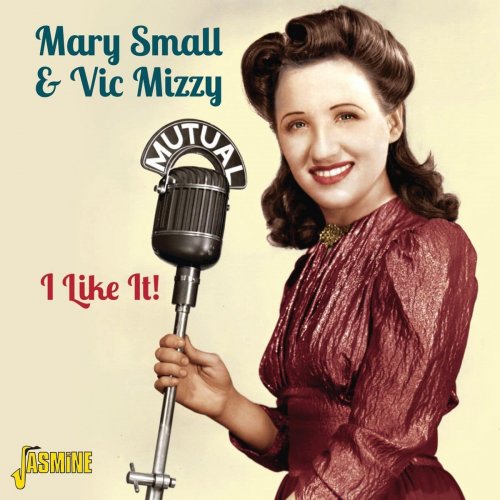
![Old Unconscious - Why Something? (2018) [Hi-Res] Old Unconscious - Why Something? (2018) [Hi-Res]](https://img.israbox.com/img/2025-12/31/bklidf83pdip6287hsne01h0a.jpg)
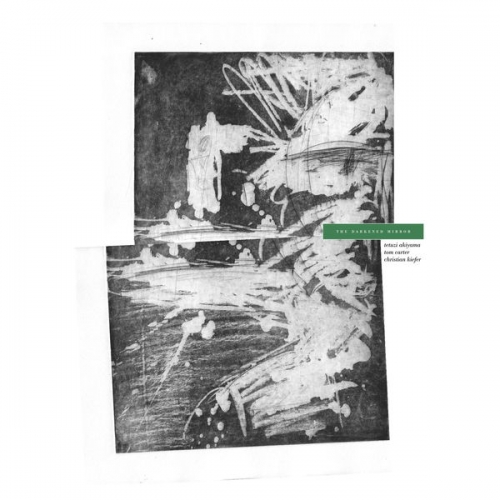
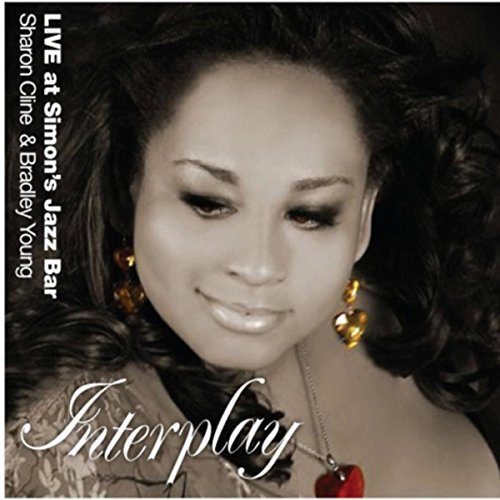
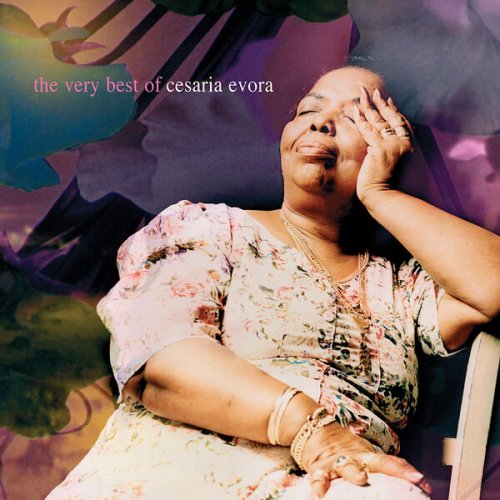
![Ben Marc - Who Cares Wins (2025) [Hi-Res] Ben Marc - Who Cares Wins (2025) [Hi-Res]](https://img.israbox.com/img/2025-12/29/nqg428wawx3giymyblda2ld32.jpg)
![Victoria Port - Barefoot In The Garden (2025) [Hi-Res] Victoria Port - Barefoot In The Garden (2025) [Hi-Res]](https://img.israbox.com/img/2025-12/29/ewzd0szcsnv1f02bzk1gno02h.jpg)
